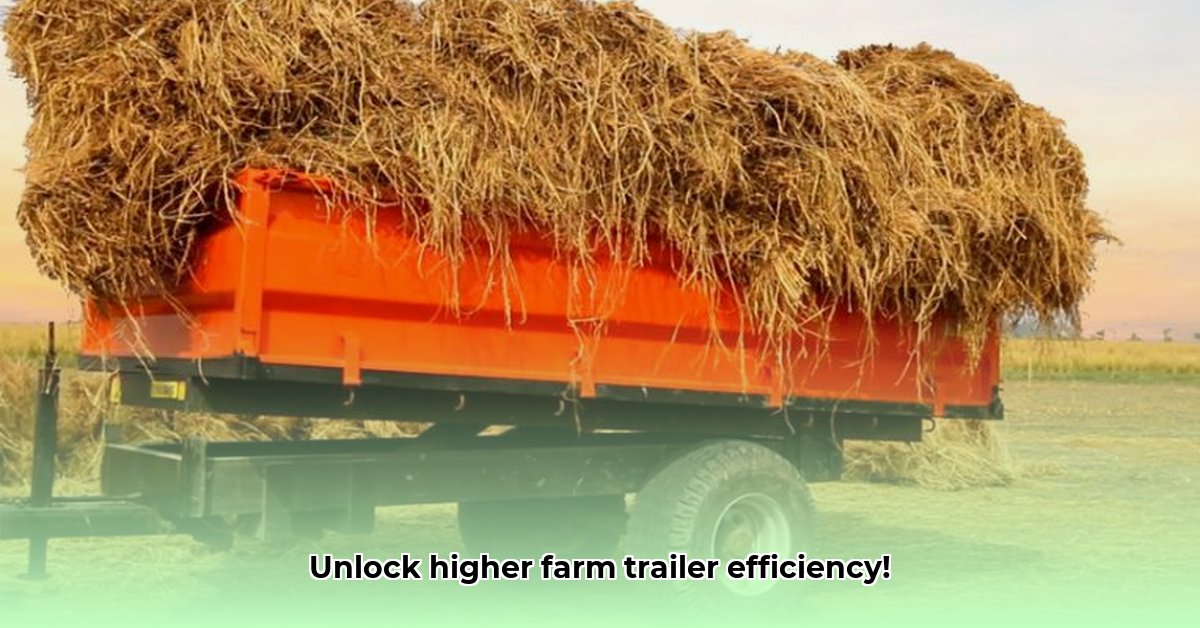
Modern farming demands efficiency and sustainability. Getting your harvest to market quickly and cost-effectively is crucial, and your farm tractor trailer plays a vital role. Specialized farm trailers are transforming agricultural transport, offering significant improvements over older, general-purpose models. For detailed wiring diagrams, check out this helpful resource: wiring diagrams. This article explores the advantages of specialized trailers, focusing on the Midsota Farm Series Dump Trailer as a prime example, and provides actionable steps to help farmers optimize their operations.
The Evolution of Farm Tractor Trailers
Traditional farm trailers often proved slow, inefficient, and prone to breakdowns. Today's specialized trailers, however, are engineered for specific tasks, maximizing efficiency and minimizing waste. The Midsota Farm Series Dump Trailer exemplifies this evolution, representing a significant leap forward in agricultural transport technology. This shift reflects a broader trend in agriculture: embracing technological advancements for increased profitability and environmental responsibility.
Specialized Farm Trailers: Key Advantages
Specialized trailers offer several key benefits:
Enhanced Efficiency: Hydraulic systems, like those found in the Midsota trailer, dramatically reduce loading and unloading times. This translates to significant labor savings and reduced fuel consumption. One farmer reported a 30% reduction in loading time using a similar model.
Exceptional Durability: Robust construction ensures longevity, minimizing repair costs and the environmental impact associated with frequent replacements. A well-maintained specialized trailer can serve a farm for over a decade, significantly reducing long-term expenses.
Customization Options: Trailers can be customized to suit various farm sizes and crop types. This adaptability makes them suitable for small family farms as well as large-scale operations.
Addressing the Challenges
While specialized trailers offer numerous advantages, challenges exist:
Higher Initial Cost: The significant upfront investment may be a barrier for some farmers. However, long-term ROI analyses often demonstrate substantial cost savings over the trailer's lifespan. Exploring financing options, such as leasing, can mitigate this initial investment hurdle.
Environmental Impact: While specialized trailers reduce waste in the long run, a thorough Life Cycle Assessment (LCA) is needed to fully evaluate their environmental footprint. This requires assessment of manufacturing processes, material sourcing, and end-of-life management.
Accessibility for Smaller Farms: Innovative solutions such as collaborative purchasing programs or equipment rental services can improve accessibility for small-scale farmers.
Actionable Steps for Different Stakeholders
The following table outlines actionable steps for different stakeholders in the agricultural sector:
| Stakeholder | Short-Term Actions | Long-Term Vision |
|---|---|---|
| Small-Scale Farmers | Explore shared purchasing programs or leasing options with fellow farmers. | Evaluate long-term cost savings and explore used equipment markets for potential savings. |
| Large-Scale Farms | Implement pilot programs to quantify efficiency gains from specialized trailers. | Integrate specialized trailers into existing fleet management and maintenance systems. |
| Equipment Manufacturers | Utilize sustainable materials and eco-friendly manufacturing processes. | Design modular trailers for flexible customization and adaptability to various needs. |
| Government Agencies | Offer financial incentives for adopting sustainable transport solutions. | Invest in improved agricultural transport infrastructure. |
Risk Assessment and Mitigation
Potential risks associated with specialized trailers include hydraulic system failures, structural damage, and supply chain disruptions. Regular maintenance, high-quality materials, and diversified supplier relationships can significantly mitigate these risks. Furthermore, adherence to all applicable safety and regulatory standards is crucial for safe and responsible operation.
Regulatory Considerations
Farmers must ensure compliance with all relevant regulations concerning trailer size, weight, and safety. Staying informed about these regulations is crucial to avoid potential penalties and ensure safe operation.
Conclusion: A Sustainable Future for Farming
Specialized farm trailers represent a significant advancement in agricultural transport, offering enhanced efficiency, durability, and customization. By carefully considering the initial investment, environmental impact, and accessibility, farmers can maximize the benefits of this technology. Embracing innovative solutions will help move agriculture towards a more sustainable and prosperous future.
1 A Simple Checklist to Evaluate ROI on Your Farm